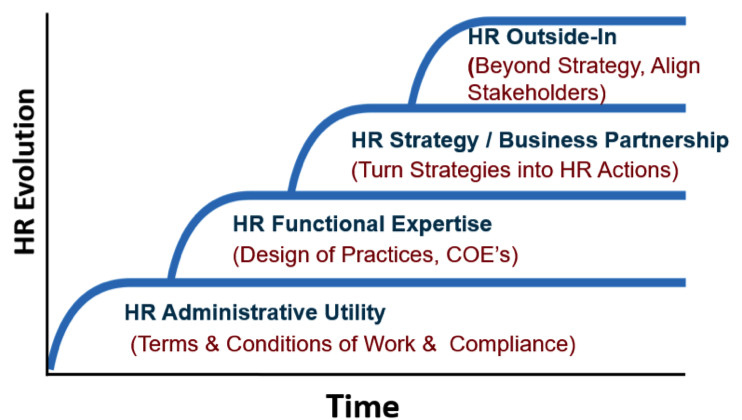Disruptions In HR That Every Pro Should Know
The concept of disruption comes from the technology world where change is rapid and on-going and transforms industries.

Disruptions In HR That Every Pro Should Know

Related Insights
The concept of disruption comes from the technology world where change is rapid and on-going and transforms industries: Google disrupted online search and advertising; Salesforce disrupted Customer Relationship Management (CRM); Amazon disrupted distribution; Uber disrupted transportation; Airbnb lodging; Facebook disrupted social experiences, and so forth.
For HR (and other disciplines like IT, marketing, finance, law), disruption denotes new ways to think about and solve problems. HR disruption is about delivery of HR services, but also about the logic behind that delivery. Disruption is not a noun with an end state, but a verb where the process of evolving HR continues. HR disruption is less about a shift leaving behind one idea for another (e.g., moving from operational to strategic) and more about a pivot of ideas building on each other (e.g., being operational and also strategic). The disruptive pivots in HR have been going on for decades and will inevitably continue. Let me highlight some of the major HR disruptions that shape HR work today (these disruptions have been and will be subject of other articles).
Value added focus of HR: towards outside in
HR is not about HR, but the value HR creates. We have seen four waves of value creation, each building on the previous platform. HR has created value from administrative efficiency to functional excellence to strategic HR and now has pivoted to HR outside in with external stakeholders. Each of these waves disrupts and builds on the previous. The outside in wave focuses, for example, on how HR delivers value to customers, investors and communities outside the organization as much as employees and line managers inside (see book HR From the Outside In).

Outcomes of HR: towards organization
As we have suggested, HR delivers value to key stakeholders in evolving ways. For decades, HR focused on the outcome of talent as characterized by the “war for talent”. Dozens and dozens of HR investments have been made to upgrade talent, workforce, or people. In our research, we have found a disruption in that HR should focus even more on organization and leadership. Organization improvements have four times the impact on business results as talent investments. HR outcomes are disrupted from only talent to talent, leadership, and organization.
Talent outcome disruptions: towards well being
Within the talent outcome, disruptions are occurring as HR pivots from focusing on employee competence (right skills, right place, right time) to commitment (behavioral engagement and showing up at work) to contribution and well being (emotional engagement and finding meaning from the work people do). Ensuring that employees experience well being from work (See our book Why of Work) disrupts and evolves the talent agenda. This may be framed as building an employee experience. In addition, the disruptive outside in logic emphasizes that better talent is assessed by the extent to which talent increases customer and investor value, not just talent for talent sake. Employee experiences are lead indicators of customer experience and investor confidence.
Organization outcome disruptions: towards capability
Since “organization” has 4 times the impact on business performance than “talent”, it is important to define what we mean by organization. Definitions of organizations have been disrupted from seeing an organization as a hierarchy or bureaucracy with clear roles, rules, routines, and responsibilities. Organizations may now be seen as bundles of capabilities, or characterizations of what the organization is known for and good at doing. In our research, we have identified which capabilities predict business success, including leveraging information, managing culture, creating change or agility, ensuring collaboration and innovation. As these capabilities become connected to market opportunities outside the organization, they disrupt how people think about, work with, and shape organizations.
Leader outcome disruptions: towards leadership, navigating paradox, and brand
There are three disruptions in leadership. First, there is a pivot from the individual leader to the collective leadership team. Leaders matters, but leadership matters more. HR should not just be about helping individuals become better leaders, but also about building collective leadership depth throughout the organization. Second, there is a disruption about the primary factor that will ensure leadership effectiveness. In recent years, leaders have been encouraged to have emotional intelligence, then learning agility (or grit, resilience, perseverance). In our research, navigating paradox has become the next wave in the evolution of leadership effectiveness. Finally, effective leadership is defined when leader’s competencies reflect promises to customers and investors (see our book Leadership Brand).
Leaders matter, but leadership matters more.
HR competencies disruptions: towards competencies that deliver outcomes
For thirty years and with 7 rounds of major data collection, we have disrupted the competencies for effective HR professionals. We have pivoted from trusted advisor to credible activist; from knowing the business to strategic positioner; from implementing an HR practice to providing integrated HR solutions; from managing change to navigating paradox. And, we have disrupted the study of competencies away from merely having the competencies to showing how these competencies increase personal effectiveness, stakeholder value, and business results.
HR Technology disruptions: towards connections
(See my article on doing an HR technology audit.)
With the pervasiveness of technology, HR has been continually disrupted. We have shown how technology investments can pivot from streamlining administrative HR work to innovating HR practices to accessing information to creating social experiences and connection. HR can use technology to build connections among people that create positive social experiences thus overcoming the demoralizing effects of social isolation.
HR analytics disruptions: towards business impact
HR analytics has been an increasingly popular topic for HR professionals. But again, the concept of HR analytics has been continually disrupted. In the 1990’s, I co-authored (with great colleagues) the book HR Scorecard. Today that book is out of date. Analytics has pivoted from a scorecard to insights based on big data to interventions about which HR practices have which results to business impact where HR drives customer share and investor confidence.
Continual HR disruption…
Whew. This is only a smattering of the HR disruptions that have gone on, are going on, and will go on as HR pivots to deliver value. In reality HR disruptions are a continual process that HR professionals need to recognize and master. The exciting disruptions HR faces today are critical to the ongoing process of HR delivering value. In my teaching, I recognize the half-life of knowledge, when 50% of my teaching materials are out of date because of the pace of HR change. For me, half life of my teaching materials is about every 2.5 to 3 years when I need to have 50% new insights on HR (and handouts, case studies, and tools). Disruption is both a challenge to stay fresh and an opportunity to continually renew.
So, what are the HR disruptions you face?
- - - -
To learn more about The RBL Group's Strategic HR Assessments, please click here.


